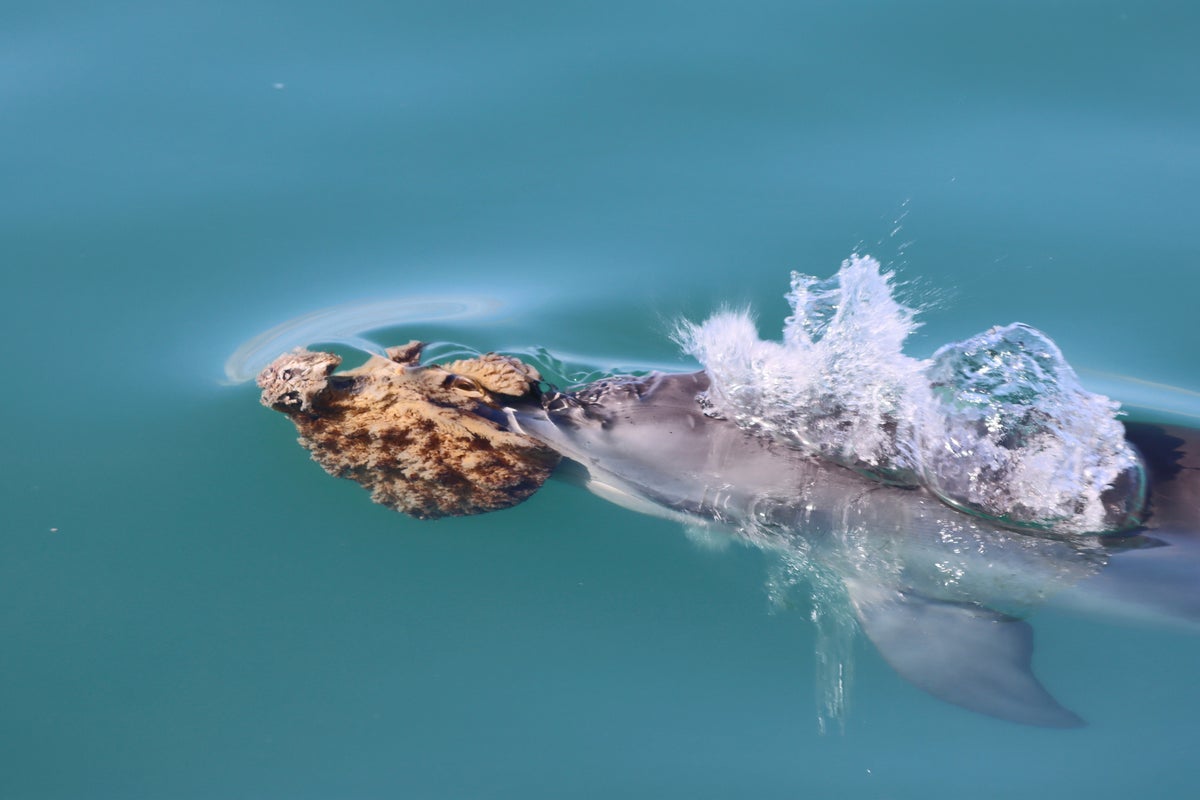Science
Dolphins Innovate Hunting Technique Using Sponges in Australia

Dolphins in Shark Bay, Australia, have adopted an innovative hunting technique that utilizes marine sponges. These bottlenose dolphins wear sponges on their beaks, resembling clown noses, to help them forage for fish hidden in rocky seabed channels. This unique method allows the dolphins to disturb the sand and flush out barred sandperch, making them easier to catch.
Recent research published in the Royal Society Open Science highlights the complexities of this behavior. While the sponge serves as a protective tool, it also hampers the dolphins’ echolocation abilities, which are vital for navigation and prey detection. Co-author Ellen Rose Jacobs, a marine biologist at the University of Aarhus in Denmark, explained, “It has a muffling effect in the way that a mask might. Everything looks a little bit weird, but you can still learn how to compensate.”
To investigate this phenomenon, Jacobs employed an underwater microphone to capture the echolocation clicks of dolphins in Shark Bay. Her analysis confirmed that these dolphins, utilizing sponges, still managed to use echolocation to locate their prey. She further modeled the extent of sound wave distortion caused by the sponges, revealing the challenges faced by these skilled hunters.
For the dolphins that successfully master this sponge-hunting technique, it proves to be an efficient way to catch fish. The size of the marine sponges varies greatly, ranging from that of a softball to a cantaloupe. However, the complexity of this hunting method is significant. Marine biologist Mauricio Cantor from Oregon State University remarked, “It’s like hunting when you’re blindfolded — you’ve got to be very good, very well-trained to pull it off.”
The rarity of this behavior is notable, with only about 5% of the dolphin population studied in Shark Bay engaging in sponge hunting, translating to approximately 30 dolphins total, according to Jacobs. Marine ecologist Boris Worm from Dalhousie University in Canada, who did not participate in the study, noted, “It takes them many years to learn this special hunting skill — not everybody sticks with it.”
Dolphin calves typically spend around three to four years with their mothers, absorbing essential life skills, including this specialized technique. The knowledge of sponge hunting is exclusively passed down from mother to offspring, as highlighted by co-author and marine biologist Janet Mann from Georgetown University.
This research underscores not only the intelligence of dolphins but also the intricate ways in which they adapt to their environments. As these marine mammals continue to innovate their hunting strategies, they provide valuable insights into the complexity of animal behavior and the importance of maternal teaching in the wild.
-

 Health3 months ago
Health3 months agoNeurologist Warns Excessive Use of Supplements Can Harm Brain
-

 Health3 months ago
Health3 months agoFiona Phillips’ Husband Shares Heartfelt Update on Her Alzheimer’s Journey
-

 Science2 months ago
Science2 months agoBrian Cox Addresses Claims of Alien Probe in 3I/ATLAS Discovery
-

 Science2 months ago
Science2 months agoNASA Investigates Unusual Comet 3I/ATLAS; New Findings Emerge
-

 Science1 month ago
Science1 month agoScientists Examine 3I/ATLAS: Alien Artifact or Cosmic Oddity?
-

 Entertainment5 months ago
Entertainment5 months agoKerry Katona Discusses Future Baby Plans and Brian McFadden’s Wedding
-

 Science1 month ago
Science1 month agoNASA Investigates Speedy Object 3I/ATLAS, Sparking Speculation
-

 Entertainment4 months ago
Entertainment4 months agoEmmerdale Faces Tension as Dylan and April’s Lives Hang in the Balance
-

 World3 months ago
World3 months agoCole Palmer’s Cryptic Message to Kobbie Mainoo Following Loan Talks
-

 Science1 month ago
Science1 month agoNASA Scientists Explore Origins of 3I/ATLAS, a Fast-Moving Visitor
-

 Entertainment2 months ago
Entertainment2 months agoLewis Cope Addresses Accusations of Dance Training Advantage
-

 Entertainment3 months ago
Entertainment3 months agoMajor Cast Changes at Coronation Street: Exits and Returns in 2025









